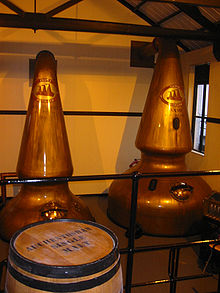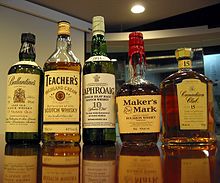Whisky
Whisky (Template:Lang-gd), or whiskey (Template:Lang-ga), refers to a broad category of alcoholic beverages that are distilled from fermented grain mash and aged in wooden casks (generally oak).
Different grains are used for different varieties, including: barley, malted barley, rye, malted rye, wheat, and maize (corn). Whisky derives from the Gaelic word for "water" (uisce or uisge), and is called in full uisge-beatha (in Scotland) or uisce beatha (Ireland), meaning "Water of Life". It is related to the Latin aqua vitae, also meaning "water of life".[1] It is always Scotch whisky, and Irish whiskey; other countries may use either spelling.
The first written record of whisky comes from 1405 in Ireland,[2] where it was distilled by monks.[1] It is also mentioned in Scotland in 1496.[3] However it is thought that whisky had already been around for at least several hundred years prior. When or where whisky was first distilled is unknown and the local, undocumented beverage production during the period makes identification of the drink's origin difficult. Additionally, it is possible that different groups discovered processes of distillation completely independently of one another.

Some scholars believe distilled spirits were first produced between the 8th century AD and 9th century AD in the Middle East[4] with the art of distillation being brought to Ireland and Britain by Christian monks. A popular legend is that St. Patrick introduced distillation to Ireland and Britain, however it is likely he lived around the 5th century AD. It is also possible that the distillation process was discovered in Ireland and possibly Britain (either independently or in precursor to Arabian distillation) by farmers as a way of making use of excess grain after harvest.
Types of whisky
Whisky or whisky-like products are produced in most grain-growing areas. They differ in base product, alcoholic content, and quality.
- Scotch whiskies are generally distilled twice, though some are distilled a third time. International laws require[5] anything bearing the label "Scotch" to be distilled in Scotland and matured for a minimum of three years in oak casks or bear a quality equal to that expected of produce from that region. Whiskies do not mature in the bottle, only in the cask, so the "age" of a scotch is the time between distillation and bottling. This reflects how much the cask has interacted with the whisky, changing its chemical makeup and taste. Whiskies which have been in bottle for many years may have a rarity value, but are not "older" and will not necessarily be "better" than a more recently made whisky matured in wood for a similar time. If Scotch whisky is from more than one cask, and if it includes an age statement on the bottle, it must reflect the age of the youngest whisky in the blend. Many cask-strength single malts also omit the age as they use younger elements in minute amounts for flavoring and mellowing.
- The two basic types of Scotch are Malt and Grain.

- Malt is whisky made entirely from malted barley and distilled in an onion-shaped pot still.
- Grain is made from malted and unmalted barley along with other grains, usually in a continuous "patent" or "Coffey" still. Until recently it was only used in blends—but there are now some "Single Grain" scotches being marketed.
- Malts and Grains are combined in various ways
- Vatted malt is blended from malt whiskies from different distilleries. If a whisky is labelled "pure malt" or just "malt" it is almost certain to be a vatted whisky. This is also sometimes labelled as "Blended Malt" whisky.
- Single malt whisky is malt whisky from a single distillery. However, unless the whisky is described as "single-cask" it will contain whisky from many casks, so the blender can achieve a taste recognisable as typical of the distillery . In most cases, the name of a single malt will be that of the distillery (The Glenlivet, Glenmorangie, Bowmore), with an age statement and perhaps some indication of some special treatments such as maturation in a port wine cask. Some single malts (often made to attract a premium price from less sophisticated drinkers abroad) will be given a special name[citation needed].
- Blended whiskies are normally cheaper whiskies made from a mixture of Malt and Grain whiskies. A whisky simply described as Scotch Whisky is most likely to be a blend in this sense. A blend is usually from many distilleries so that the blender can produce a flavour consistent with the brand, and the brand name (e.g. Bell's, Chivas Regal) will usually not therefore contain the name of a distillery. However, "Blend" can (less frequently) have other meanings. A mixture of malts (with no grain) from different distilleries (more usually called a vatted malt) may sometimes be referred to as a "Blended Malt", and a mixtures of grain whiskies with no malts will sometimes carry the designation "Blended Grain".
- Japanese whiskies generally fit within the Scotch tradition and can be categorised using the above typology.
- Irish whiskeys are generally distilled three times and must be aged in wooden casks for a period of not less than three years.[6] Unpeated malt is almost always used.
- Canadian whiskies have the regulatory requirement[7] of being aged for at least three years in a barrel. Most Canadian whiskies are blended multi-grain whiskies.

- American whiskeys include both straights and blends. To be called "straight" the whiskey must be one of the "named types" listed in the federal regulations and aged in oak casks for at least two years. The most common of the "named types" are;
- Bourbon, which must be between 51% and 79% (inclusive) corn (maize).
- Rye, which must be at least 51% rye.
- Corn, which is made from a mash made up of at least 80% corn (maize). The whiskey is distilled to not more than 80 percent alcohol by volume. It does not have to be aged but, if it is aged, it must be in new uncharred oak barrels or used barrels. Aging usually is brief, i.e., six months. During ageing the whiskey picks up colour and flavour and its harshness is reduced.
- All straight American whiskeys except straight corn whiskey must be aged in new casks that have been charred on their inside surface. American blended whiskeys combine straight whiskey with un-aged whiskey, grain neutral spirits, flavourings and colourings. These definitions are part of U.S. law. Not defined by the law but important in the marketplace is Tennessee whiskey, of which Jack Daniel's is the leading example. It is identical to bourbon in almost every important respect. The most recognizable difference is that Tennessee whiskey is filtered through sugar maple charcoal, giving it a unique flavour and aroma.
- Pure pot still whiskey refers to Irish whiskey made from a combination of malted and unmalted barley and distilled in a pot still.
- Welsh whisky
- Indian whisky is an alcoholic beverage that is labelled as "whisky" in India. Much Indian whisky is distilled from fermented molasses, and as such would be considered a sort of rum outside of the Indian subcontinent.[8] 90% of the "whisky" consumed in India is molasses based, although India has begun to distil whisky from malt and other grains.[9]
Names and spellings
Whisky is an Anglicisation of the 17th century Irish uisce beatha (IPA: [ɪʃkʲə bʲahə]) meaning "water of life". The name itself may have originally derived from a Goidelic translation of the Latin phrase aqua vitae.
The spelling whisky (plural whiskies) is generally used for whiskies distilled in Scotland, Wales, Canada, and Japan, while whiskey is used for the spirits distilled in Ireland. A 1968 directive of the Bureau of Alcohol, Tobacco and Firearms specifies "whisky" as the official U.S. spelling, but allows labelling as "whiskey" in deference to tradition; most U.S. producers still use the latter spelling, Early Times Maker's Mark, and George Dickel being among the few exceptions.
In the late Victorian era, Irish whiskey was the world's whiskey of choice. Of the Irish whiskeys, Dublin whiskeys were regarded as the grands crus of whiskeys. In order to differentiate Dublin whiskey from other whiskeys, the Dublin distilleries adopted the spelling "whiskey". The other Irish distilleries eventually followed suit. The last Irish "whisky" was Paddy, which adopted the "e" in 1966.
A mnemonic used to remember which spelling is used is that "Ireland" and "United States" have at least one "e" in their names, while "Scotland", "Canada" and "Japan" do not. Welsh whisky is an exception to this rule.
In many countries, the abbreviated term "Scotch" is often used for "Scotch whisky". However in Britain the term "Scotch" is relatively rare and "whisky" generally refers to "Scotch whisky". There is no relation to scotch tape.
Health effects
The health benefits of drinking alcohol in moderation (better health and greater longevity) commonly associated with wine appear to apply also to whisky. Most researchers now believe that the beneficial substance is the alcohol itself—although it has not been ruled out that other components in the beverages are also responsible for the beneficial effects.[10] However, excessive consumption of any form of alcohol can negatively impact almost all of the body's essential systems, particularly the liver. [1] Furthermore the frequent consumption of strong spirits, such as whisky, significantly increases a person's chance of contracting head and neck cancers[11]
See also
- Whisky Olympics
- Whiskey Rebellion
- American Whiskey Trail
- Moonshine (illegally produced whiskey)
- List of cocktails made with whisky
- List of whisky brands
- Bottled in bond
References
- ^ a b Lloyd, J & Mitchinson, J: "The Book of General Ignorance". Faber & Faber, 2006.
- ^ "Who invented whisky - the Scots or the Irish?". Retrieved 2007-02-18.
- ^ "History of Scotch Whisky". Retrieved 2007-02-16.
- ^ David J. Hanson, Ph.D. "History of Alcohol and Drinking around the World". Retrieved 2007-01-23.
- ^ "ASIL Insight: WTO Protections for Food Geographic Indications". Retrieved 2007-08-25.
- ^ Government of Ireland. "Irish Whiskey Act, 1980".
{{cite web}}: Unknown parameter|retrieved=ignored (|access-date=suggested) (help) - ^ "Food and Drugs Act, Food and Drug Regulations (C.R.C., c. 870)". Retrieved 2007-01-23.
- ^ "Battle for the world's largest whisky market -- India" - South Africa Mail & Guardian, Mar. 3, 2006, accessed June 25, 2007
- ^ Official web site of Amrut Distilleries, accessed June 25, 2007
- ^ David J. Hanson, Ph. D. "Alcohol in the Diet: Facts and Information".
- ^ "Throat cancer - Squamous Cell Carcinoma of the Tonsil". virtualcancercentre.com. Retrieved 2007-02-16.
{{cite web}}: Italic or bold markup not allowed in:|publisher=(help)
External links
- Shrine To Spirits How Whisky Differs from Country to Country
- Bourbon Whiskey Ratings and Discussion Comprehensive list of bourbon whiskey, including ratings
- The Art Of Distilling A Video Guide into the Art Of Distilling
- ScotlandWhisky Site supported by VisitScotland and the Scotch Whisky Association to assist distillery visits.
- Best of Whisky Whisk(e)y Industry News Source
- Whisk(e)y, etymology
- Latest news from the Whisky industry
- Single malt whisky site; distillery info, bottle shots and nosing and tasting notes.
